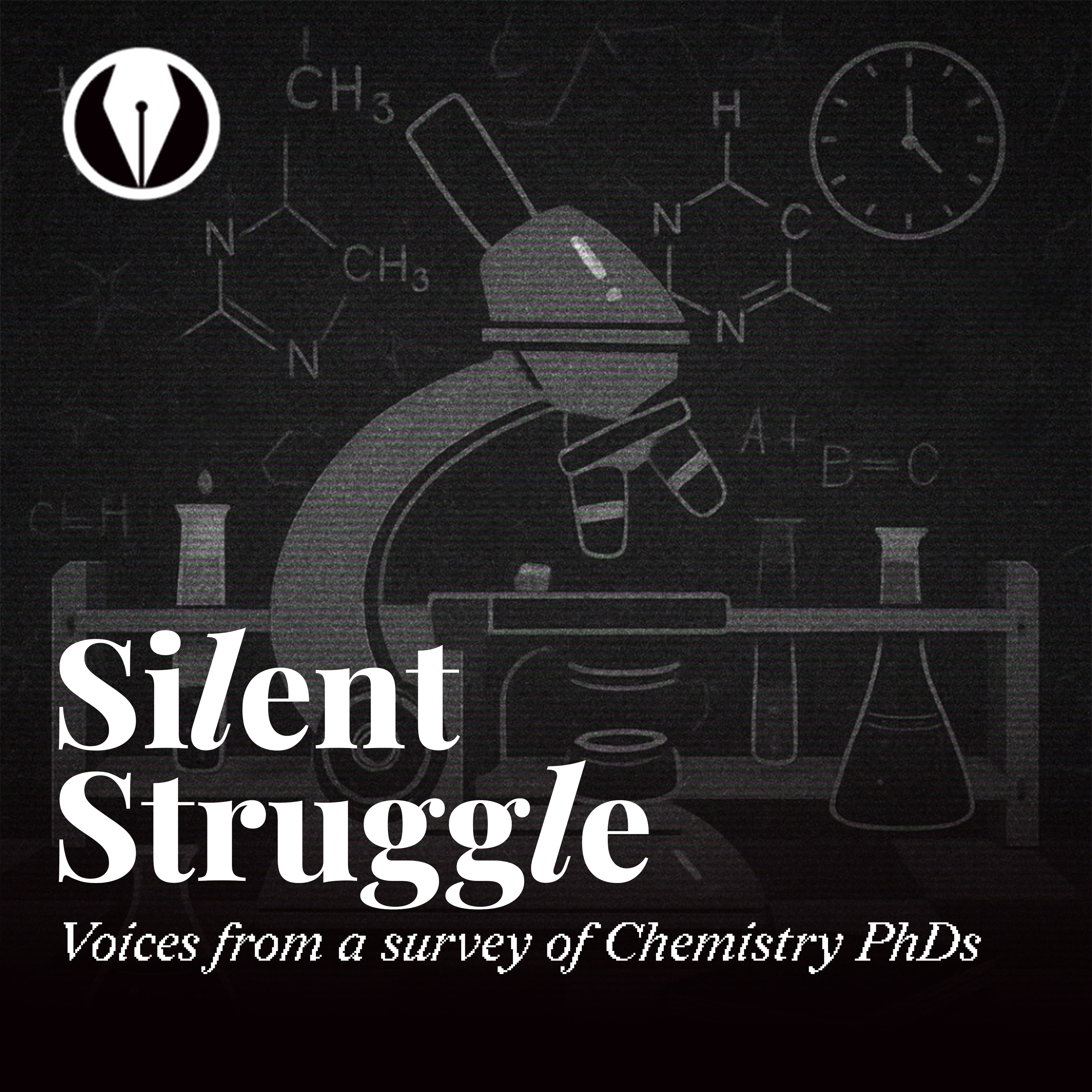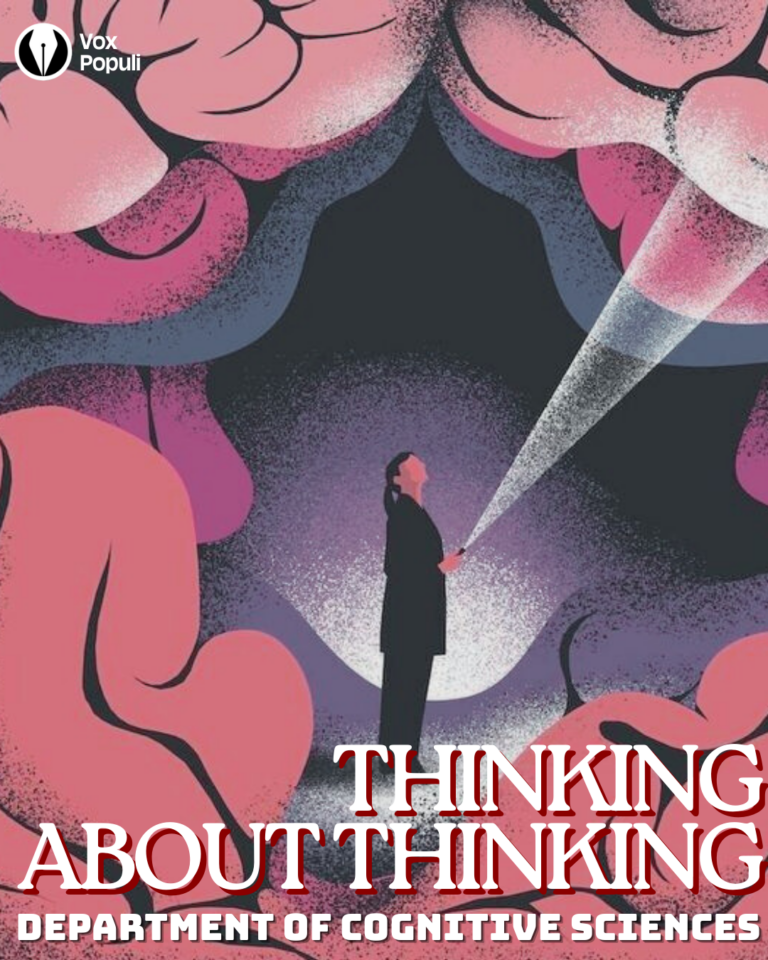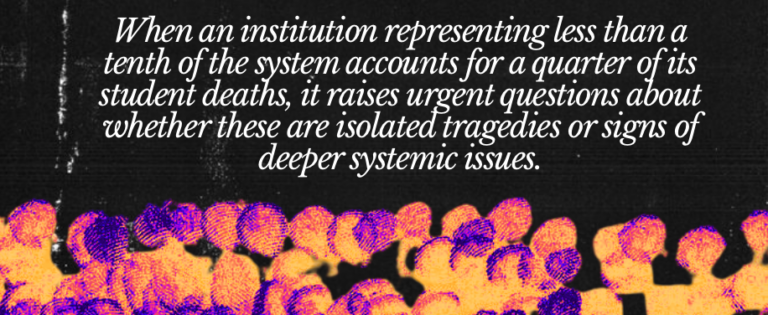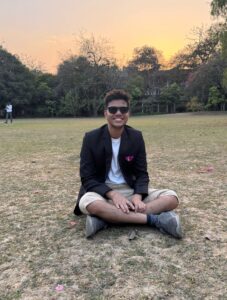Disclaimer: Vox Populi, IIT Kanpur, is the exclusive owner of the information on this website. No part of this content may be duplicated, paraphrased, or interpreted in any other way without written consent from Vox Populi. If you want to reproduce any of the content on this page, please contact our chief editors directly or reach out to us by email at voxiitk@gmail.com.
On the 10th of February 2025, Mr Ankit Yadav, a PhD scholar in the Department of Chemistry, took his own life. He was a research scholar who joined the institute in July 2024 with a UGC Fellowship.
A statement from the Kanpur Police Commissioner via a post on X noted the occurrence of the suicide and indicated that the necessary legal procedures were set to begin.
During the late hours of 10th February, students visited the Director at his residence in order to raise concerns regarding the circumstances of the incident. Following this, the PhD and PostDoc students of the Chemistry Department wrote an open letter titled, “Urgent Request for Judicial Inquiry into Suicidal Incident and Mental Harassment by Prof. Parthasarathi Subramanian.” The letter indicated that 10 students had left the said professor’s lab in the past few years. We reached out to people who were previously involved with the Professor’s lab and tried to understand their views.
Disclaimer: This letter is not written/compiled by Vox and represents the views of the individuals involved.
Accounts from Former Lab Members
Disclaimer: This is an account of people who formerly worked at the lab, presented here in a concise manner. These are personal testimonies compiled by Vox and represent the views of the individuals involved
Lab Culture and Working Hours
Multiple former members recall that their initial interaction with Prof. Parthasarathi Subramanian was pleasant, but this changed soon after joining the lab. It was made clear from the second day that lab timings were strictly enforced— 8:30 AM to 9:00 PM. Students were expected to be inside the lab at exactly 8:30 AM. Even a short delay would result in a phone call from the professor, warning them about their future in the lab. Additionally, students were often required to work in the lab at midnight.
These constraints extended to meal breaks. Students were allotted exactly 40 minutes for lunch, and extra time spent was questioned. A tea break at 5:30 PM was permitted, but they were required to return precisely at 6:00 PM. On multiple days, dinner time was disrupted by the professor, who would begin long discussions on Chemistry research at 8:45 PM.
Surveillance and Control
Several students confirmed that CCTV cameras were installed in the lab, and they suspected the professor had remote access to live footage. When away from the lab, he would call one student and ask them to pass the phone around to verify everyone’s presence.
This also extended to monitoring and purchase of chemicals. While most labs purchase standard chemicals commercially, students here were expected to synthesise them manually, which significantly increased their workload.
Academic Pressure and Mental Health Struggles
Weekly work reports were mandatory in his lab, and students were required to conduct a minimum of five successful reactions per week. Failure to meet this resulted in reprimands. Additionally, every Saturday, a Literature Group Meeting was held, and every student was required to present a paper. This is different from other groups, where usually one student would present each week or every other week on a rotating basis.
The immense pressure led to physical and mental health deterioration. At least one former student reported weight loss and frequent fevers due to stress. Others struggled to even speak to their families due to the mental burden.
Punishments and Harsh Treatment
A student recalled an incident where someone was caught speaking in Hindi inside the lab. The professor claimed that the student was “destroying the lab culture” and threatened expulsion. Another described how even minor mistakes would be repeatedly brought up for months, used as a pretext for constant scolding.
Some students described a feeling of helplessness —even those who left the lab found it difficult to recover professionally.
Why Students Don’t Report
Despite all these incidents, most students never officially reported the professor’s behaviour. The primary reason? Fear.
The professor frequently threatened students with expulsion from the lab, knowing that leaving mid-PhD would destroy their academic careers. The intense mental stress made students feel isolated and incapable of seeking help.
Some students needed recommendations and certificates from the professor for future applications, forcing them to endure the environment.
Survey
Following these events, we conducted a survey among PhD students in the Chemistry Department to assess the current situation and gather insights on their experiences. Out of nearly 300 PhD students in the Chemistry Department, 107 of them responded to this anonymous survey. We present the data and anecdotal evidence collected here.
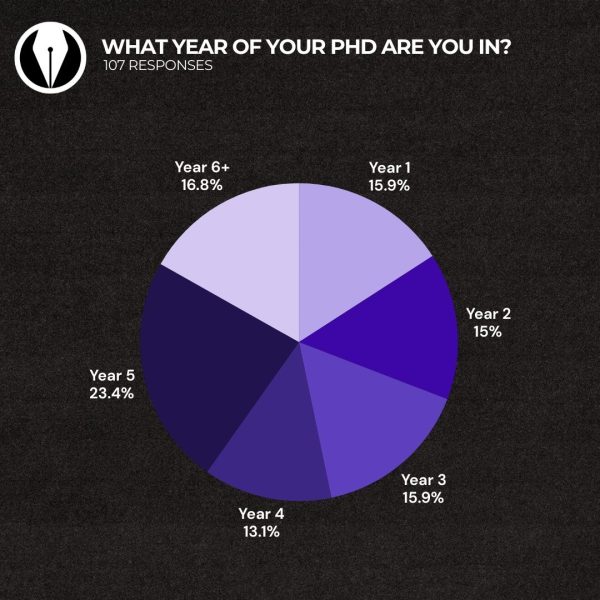
Supervisor-Student Dynamics
Majority of the students find their supervisor fairly approachable. However, 43 students find their supervisor unreasonably strict or dismissive of their concerns. 61% of respondents (65 students) stated that they had not personally experienced power abuse from their supervisor.
However, the remaining respondents either directly faced or witnessed instances of discrimination, mental harassment, undue pressure, or threats. These included instances of
- Casual Sexism
- Casteism
- Elitism
- Favoritism
- Quid Pro Quo (Exchange of favours for academic benefits)
- Attempts of physical abuse by Seniors





“Some seniors abuse their authority in labs, making it difficult for new students. The power structure doesn’t only exist with professors but also within lab groups.” – Anonymous Response.
Lab Culture and Work Load
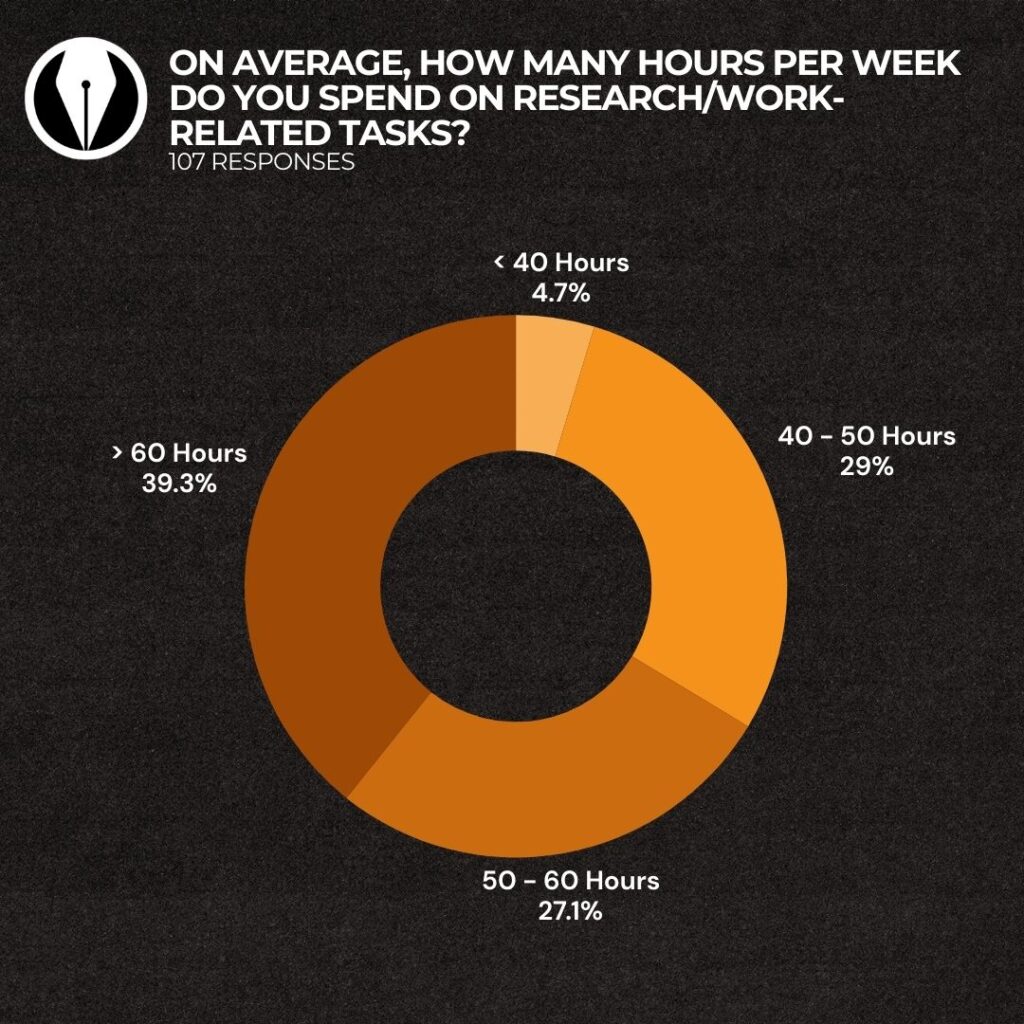

Apart from all five working days, 96 students have Saturday as a working day in the lab, and 13 students have Sunday as a working day, and all these 13 students also said Saturday as a working day, making all 7 days working days.
Lab working hours varied significantly:
- A majority of students reported workdays starting between 8:30 AM and 10:00 AM, with end times ranging from 7:30 PM to 12:00 AM.
- Some students mentioned flexible work hours, while others cited strict adherence to long working hours, often extending past dinner.
- A few reported no fixed end time, stating that work depended on personal progress and deadlines.
The survey results indicate a mixed response regarding the ease of taking leave from labs. On a scale of 1 to 5 (1 being extremely difficult and 5 being very easy), only 17.7% of students (8.4% rated 1 and 9.3% rated 2) found it very difficult to get leave. In contrast, nearly 60% (27.1% rated 4 and 32.7% rated 5) found it relatively easy to take leave, with 22.4% remaining neutral.
While most students did not find taking leave extremely difficult, a notable fraction still experienced inconsistencies in leave policies across different labs.




85% of students (91 out of 107) reported that their labs had no audio-video surveillance, while 12.1% (13 students)confirmed its presence. Around 3% (3 students) preferred not to disclose this information.
“At IIT Kanpur, research scholars are no longer treated as scientists but as laborers burdened with deadlines. Their schedules are micromanaged to the point where even their lunch breaks are monitored.” – Anonymous Response.
Institutional Response & Policies


The survey reveals that a majority (72.9% or 70 out of 96 respondents) do not feel comfortable reporting academic harassment due to fear of retaliation. Many students have refrained from lodging complaints, citing risks to their careers, lack of independent grievance mechanisms, and concerns about bias.
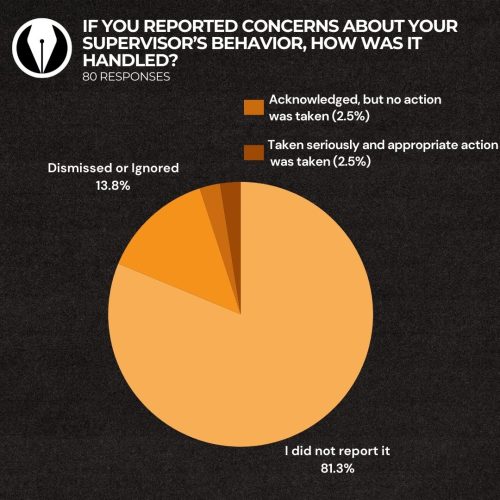
Among those who did report issues, authorities approached included the Head of Department (HOD), Department Postgraduate Committee (DPGC), Director, and Dean of Students’ Affairs (DOSA).
However, multiple responses indicate that students perceive these mechanisms as ineffective or inaccessible. They believe there is a need for
- More mental health resources (83 Respondents)
- Stricter policies against academic harassment (89 Respondents)
- Anonymous reporting system for grievances (83 Respondents)
- Supervisor training for empathy and mentorship (79 Respondents)
- Reduced Workload Expectations (57 Respondents)
“If you complain, your PhD might get delayed. That’s the unspoken rule.” – Anonymous Response.
Supervisor’s Empathy and Emotional Support
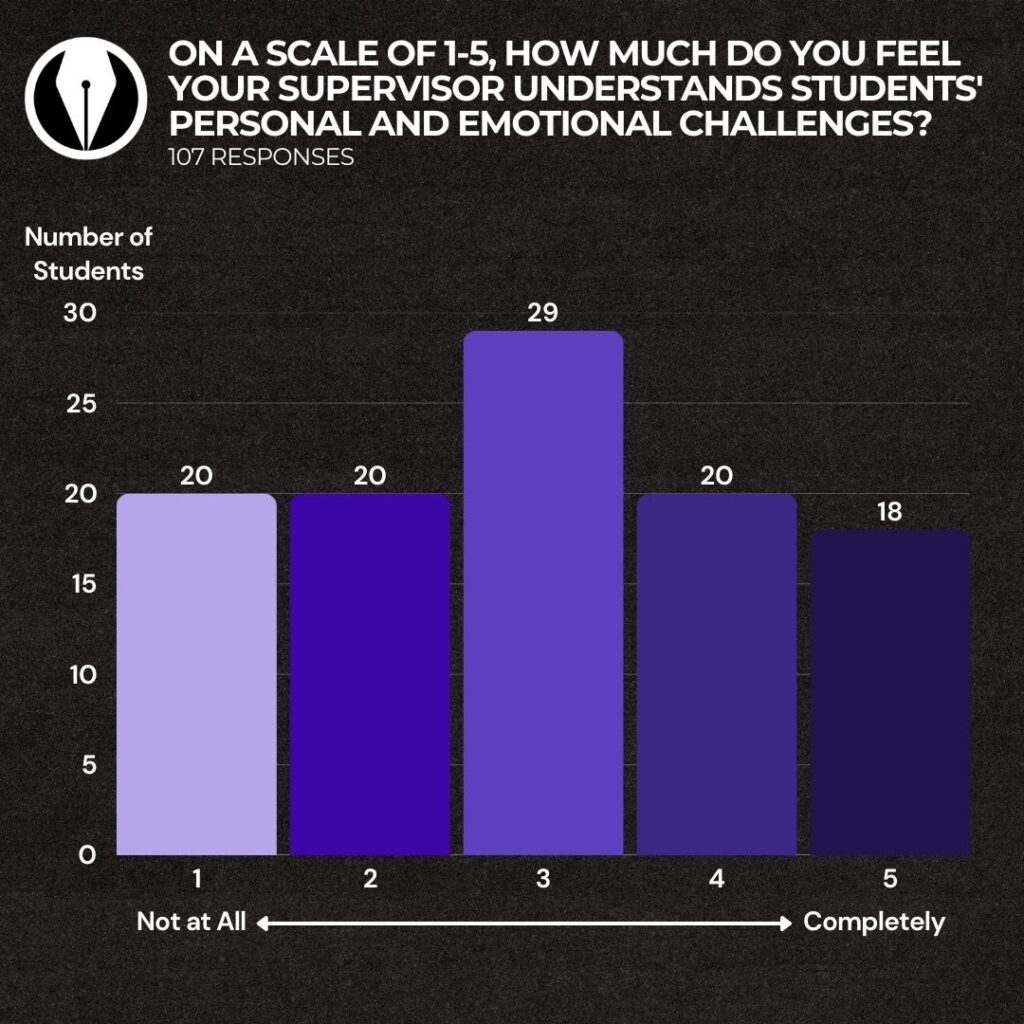
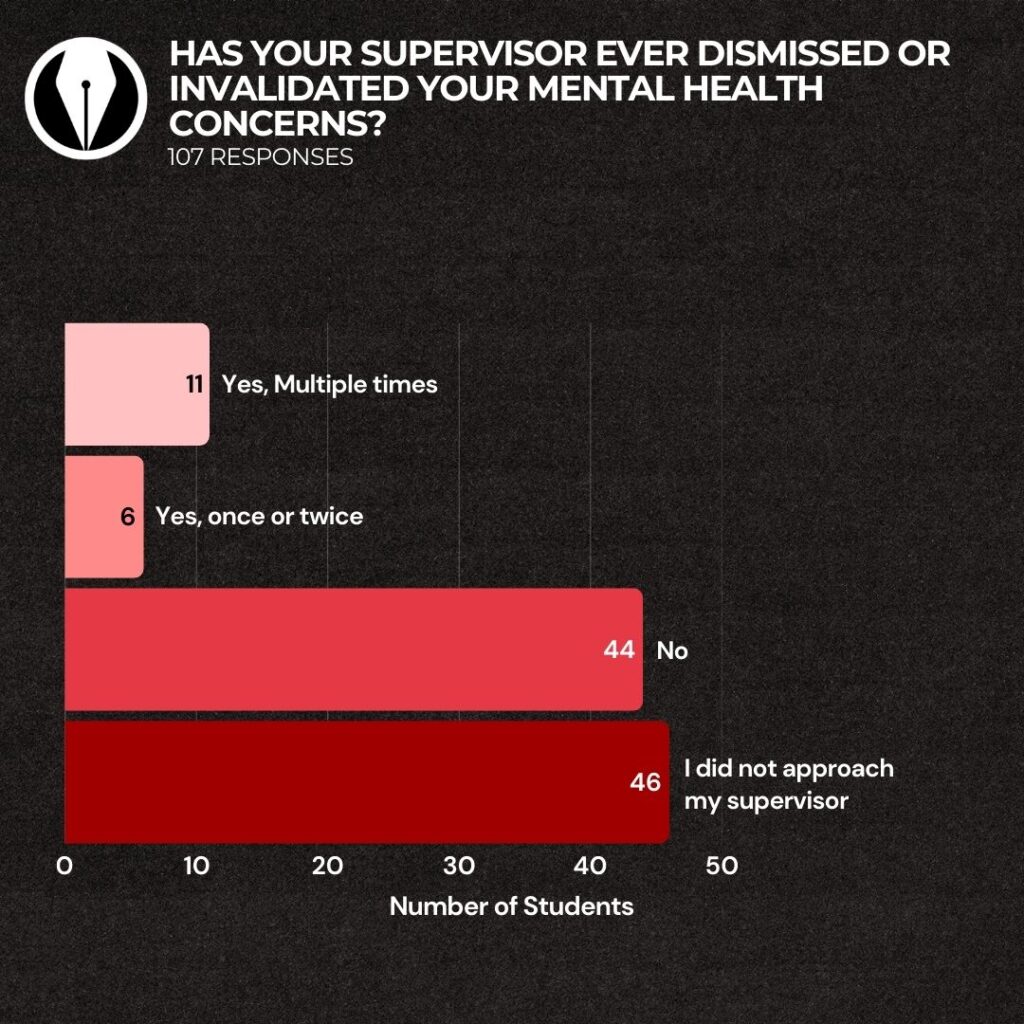
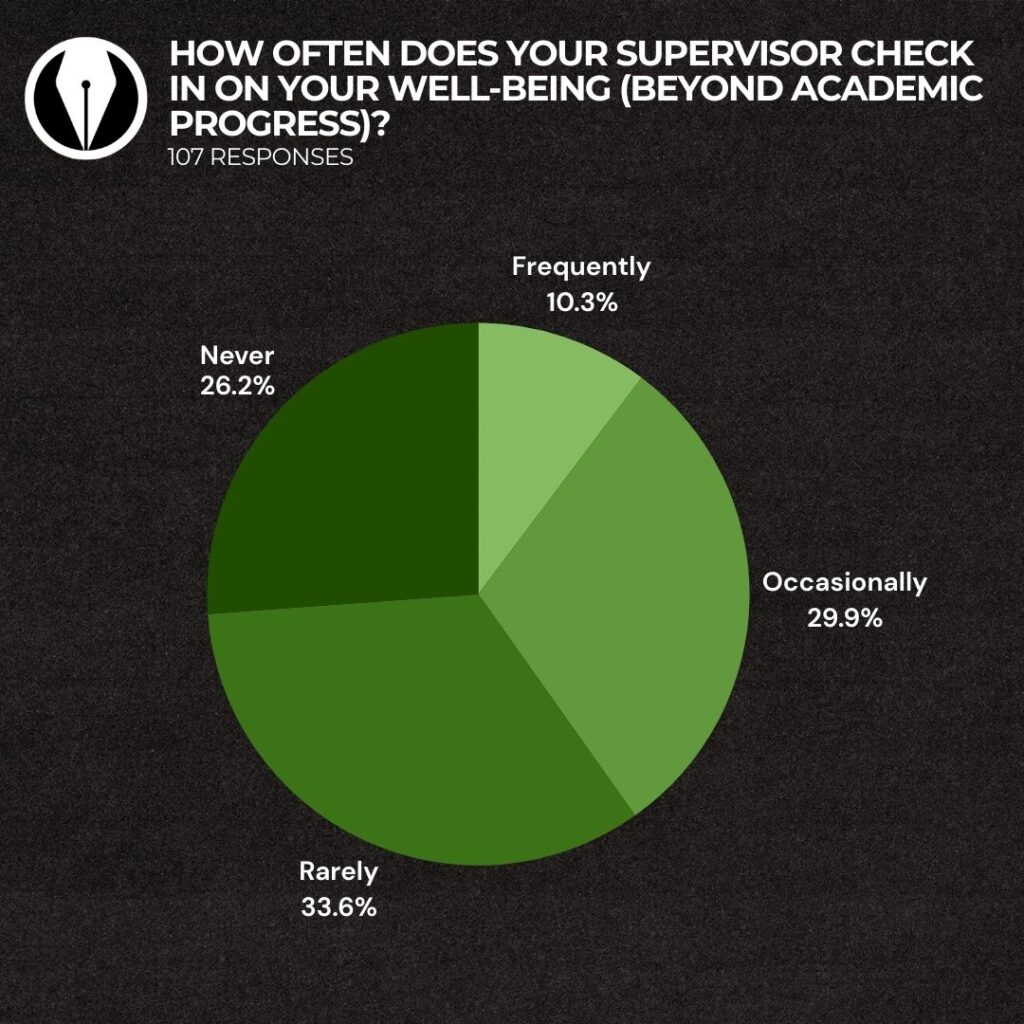
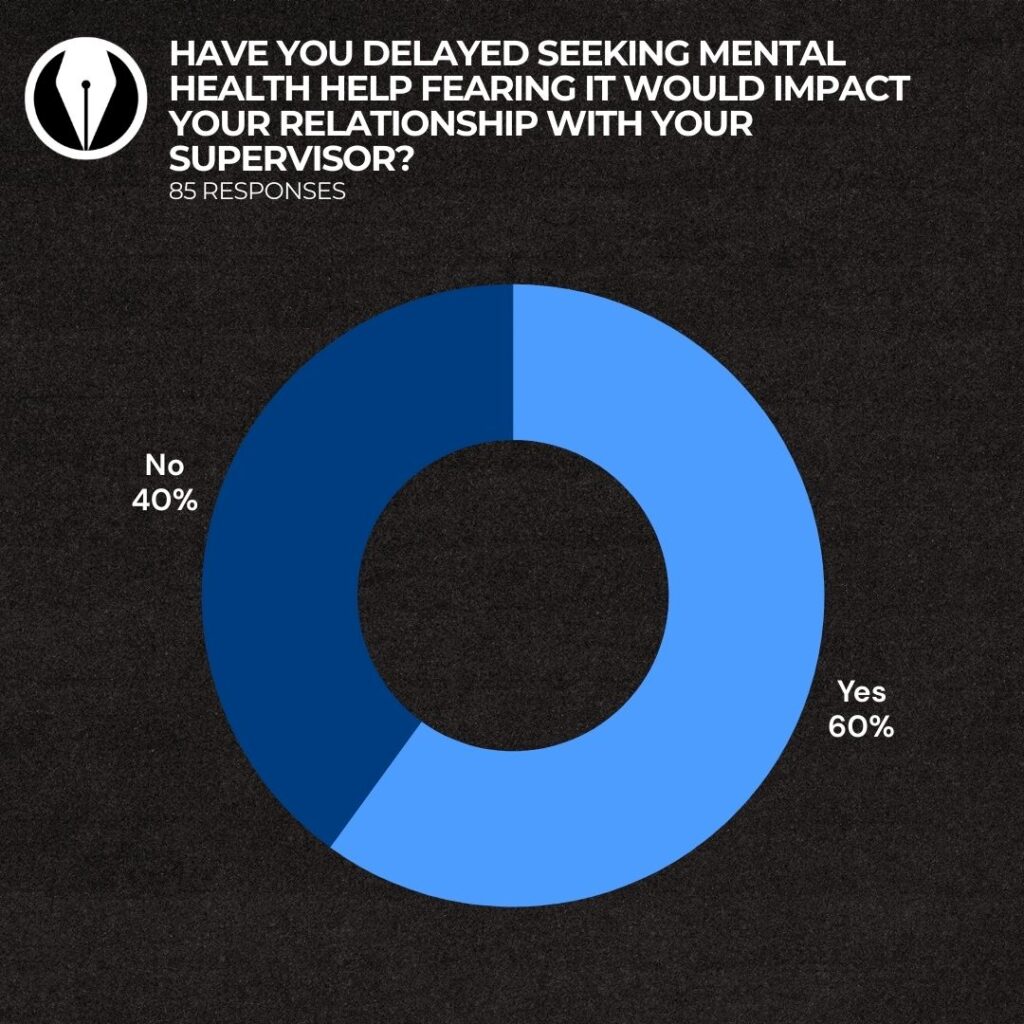
A total of 46 respondents (43%) indicated that they did not approach their supervisor regarding mental health issues. Meanwhile, 44 respondents (41.1%) reported that their supervisor did not dismiss or invalidate their concerns. A smaller proportion indicated negative experiences, with 11 respondents (10.3%) stating their concerns were dismissed once or twice and six respondents (5.6%) reporting multiple instances of dismissal.
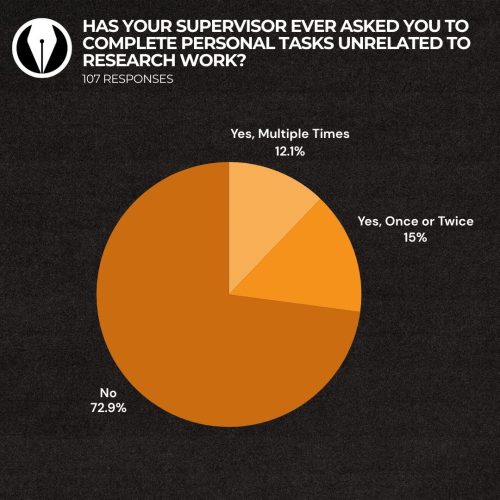
When asked whether the supervisor asked them to complete his/her personal tasks unrelated to research work, 16 respondents (15%) stated that they were asked once or twice, and 13 respondents (12.1%) reported being asked multiple times.
Mental Health & Institutional Support
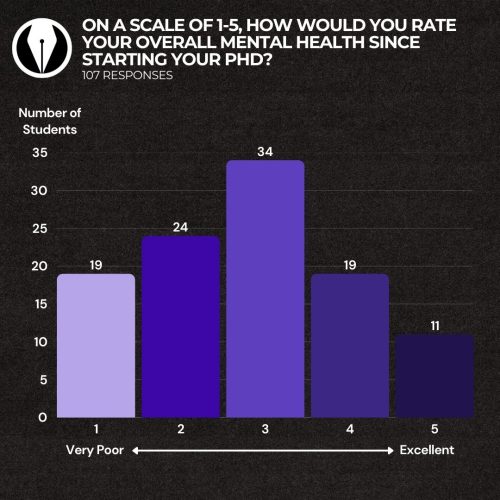
Out of 107 respondents, 68% (73 students) rated their mental health as below optimal (1-3 on a scale of 5). These numbers suggest that mental health concerns are prevalent among PhD students in chemistry dept.
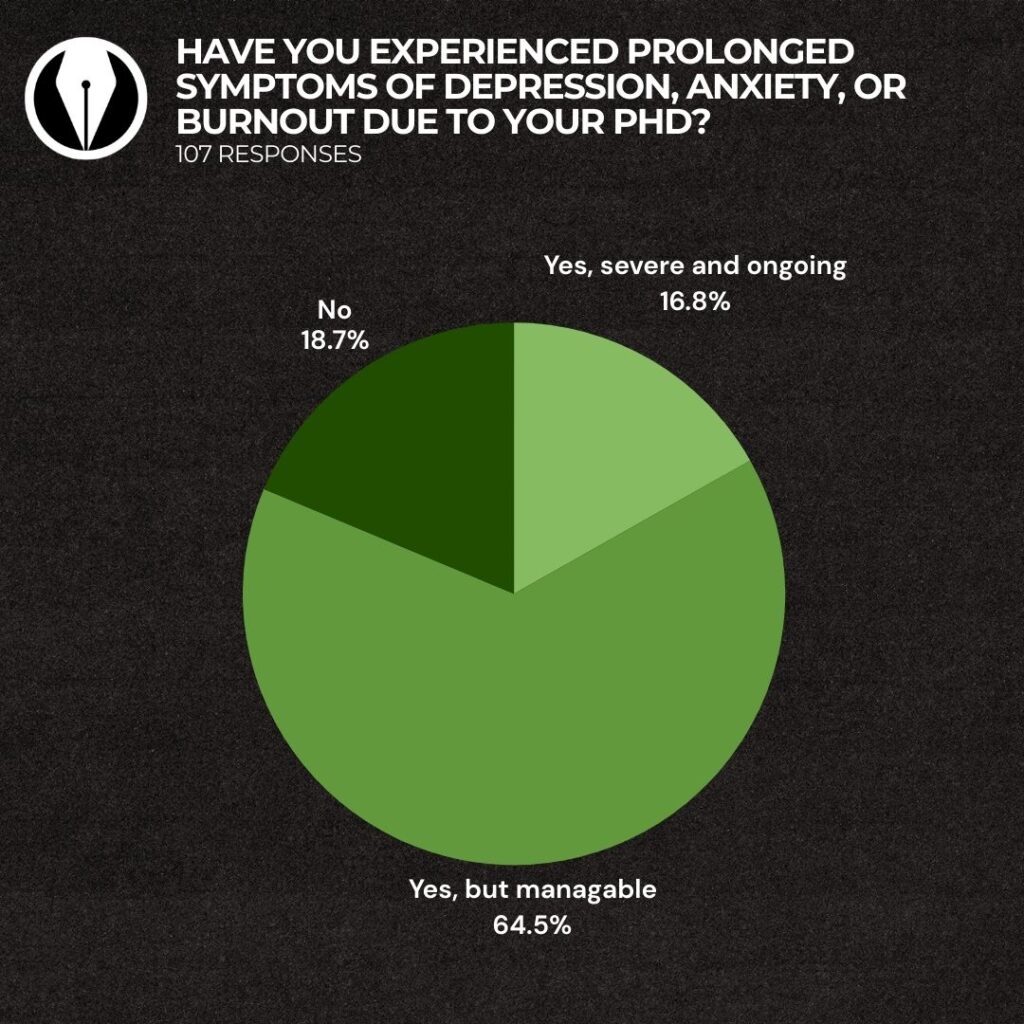
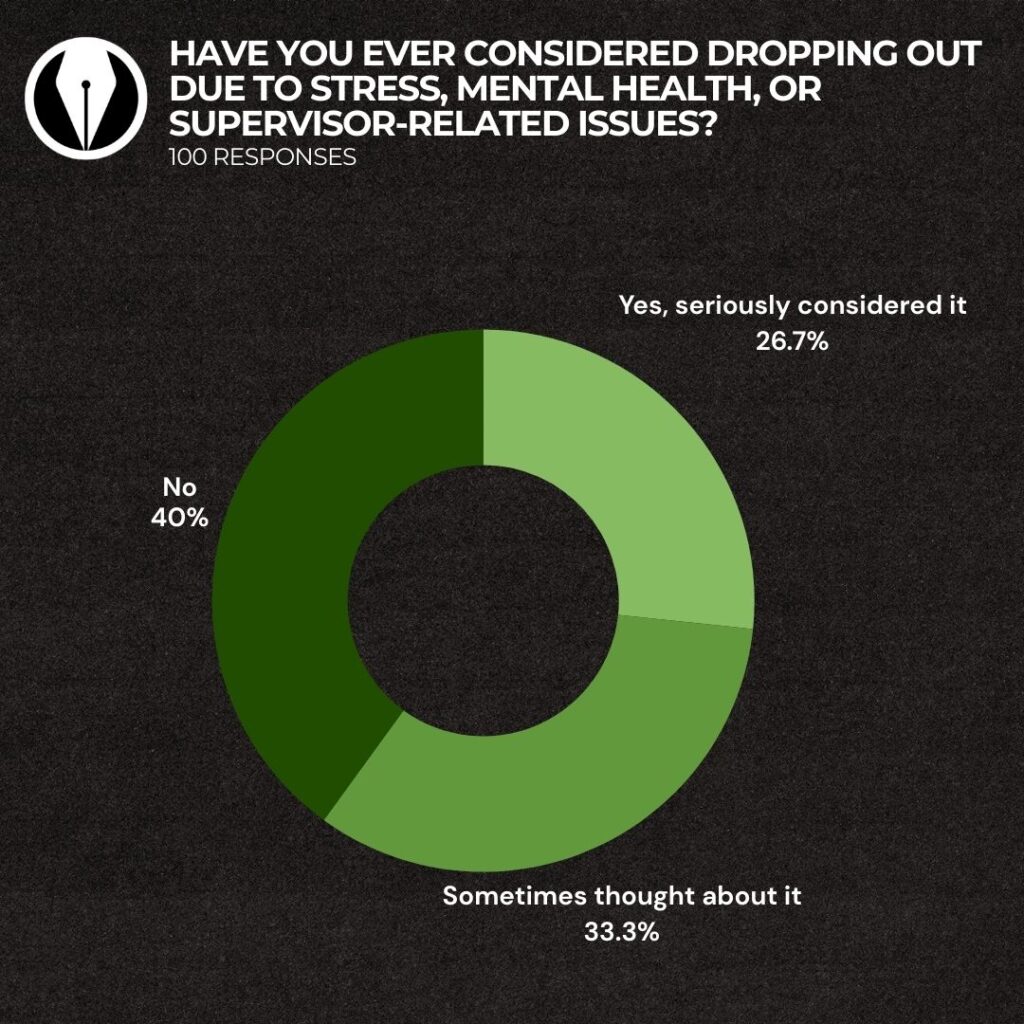
16.8% (18 students) reported experiencing severe and ongoing symptoms of depression, anxiety, or burnout due to their PhD, while 64.5% (69 students) found them manageable.
24% (24 students) seriously considered dropping out due to stress, mental health, or supervisor-related issues, while 40% (40 students) sometimes thought about it.
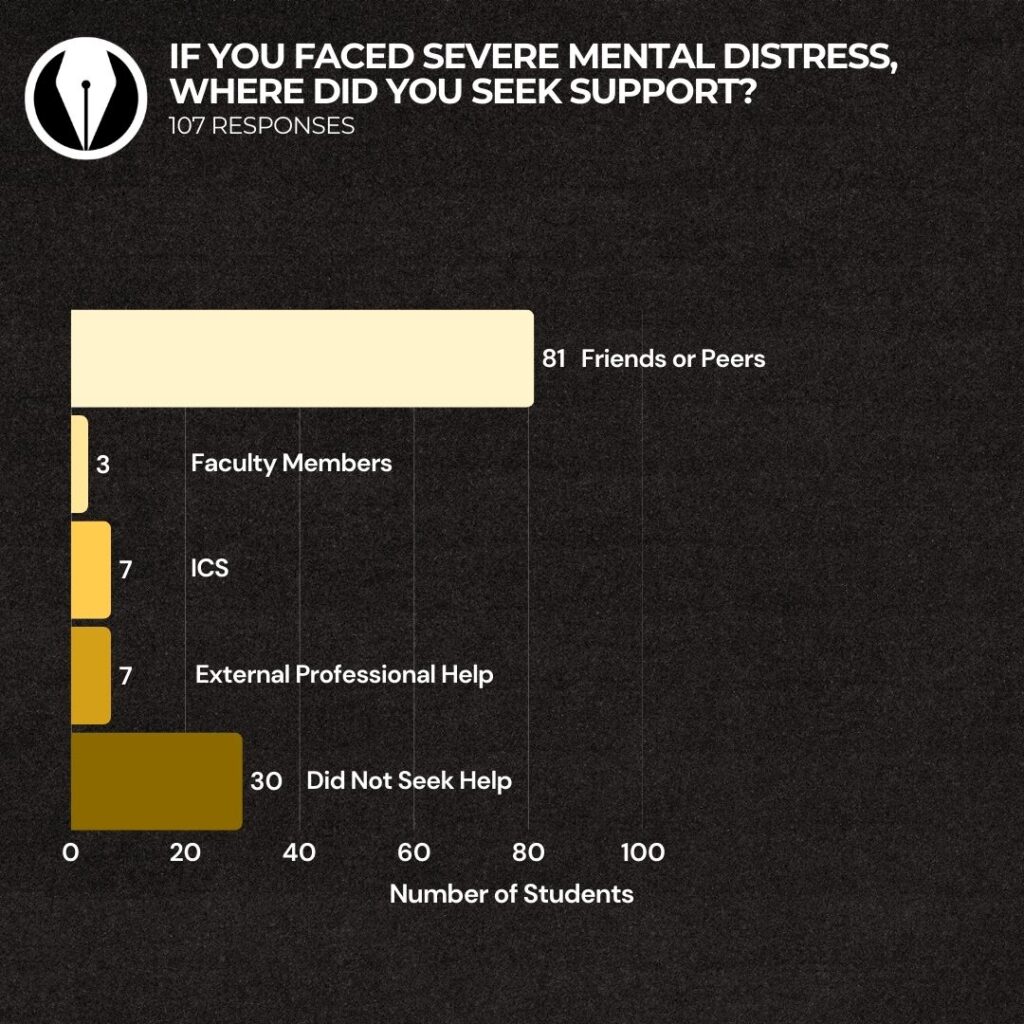
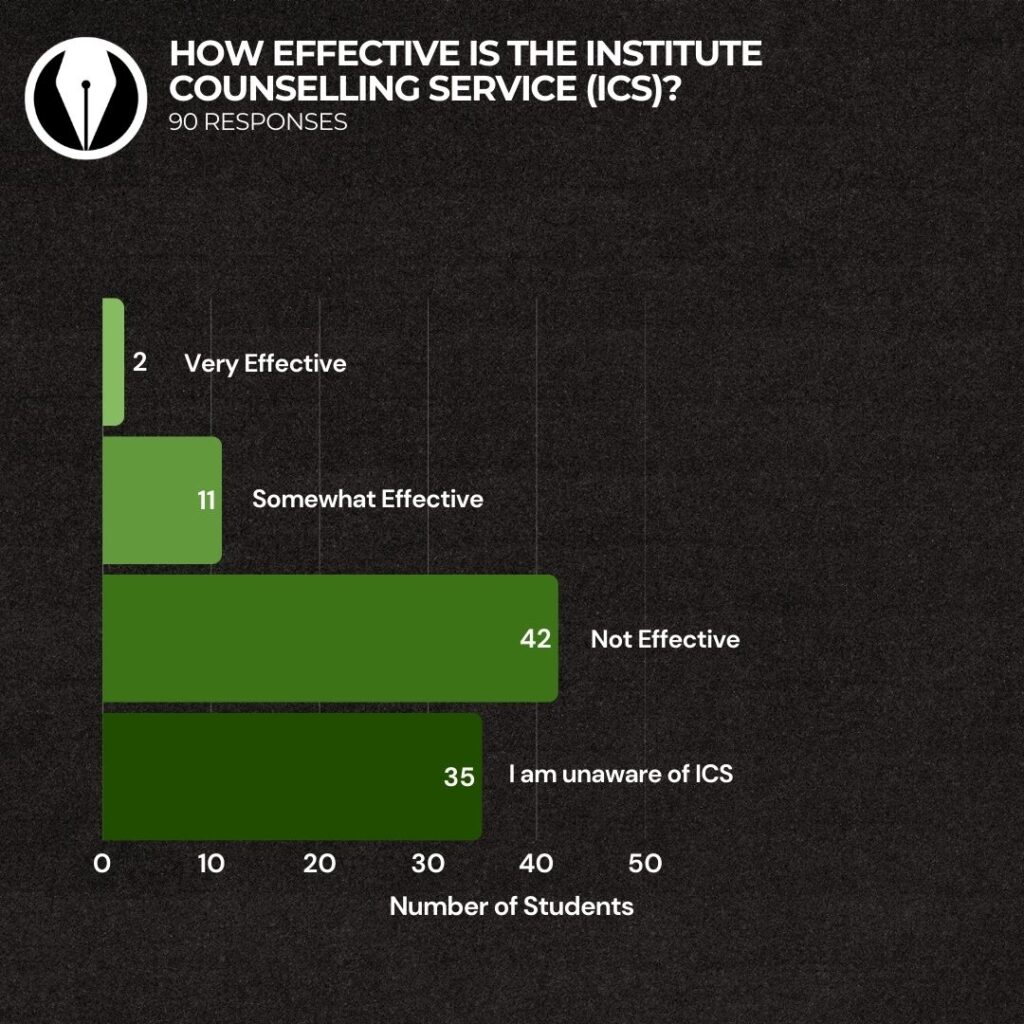
A significant portion of students expressed distrust in ICS (Institutional Counseling Services) due to concerns about lack of confidentiality, ineffective support, and fears of information leaks reaching supervisors.
Common reasons cited for avoiding ICS included:
- Lack of awareness about ICS services.
- Fear of breach of confidentiality.
- Concerns about unskilled counsellors.
- Reports of ICS being ineffective in addressing academic stressors such as workload, supervisor behaviour, and lab timings.
- Perceived risks of information being shared with supervisors.
- Preference for seeking support from peers rather than ICS professionals.
“Counselors are ineffective. If ICS was truly confidential, more people would use it” – Anonymous Response.
Student Reaction
Disclaimer: We reached out to the administration and student nominees for further updates but did not receive a response. Should we receive their input, it will be incorporated into a follow-up to provide a more complete account.
Executives of the Student Gymkhana organised a candle march from Hall – 7 to Kargil Chowk in memory of the lost soul. Following this, an open house with Gymkhana Representatives was conducted at the OAT. This was attended by a large number of students who, after elaborate discussions, arrived at a comprehensive set of demands. We summarise the set of demands and the response from the administration in the next paragraph.
Immediate suspension of Prof. Parthasarathi Subramanian: Until the external committee’s investigation is concluded, Prof. Subramanian be suspended. Additionally, he should not have any communication with the students in his lab till then. He should also be relieved of his position as the Maintenance Warden of Hall 10.
Prof. Parthasarathi has been relieved of his position as the Maintenance Warden of Hall X.
Regarding Prof. Subramanian’s lab: As communicated to the student representatives, the lab has been closed until further notice. However, it should be ensured that the lock be installed by the institute and not by the professor. Further, ensure that surveillance footage from labs is preserved and presented to the investigation committee.
Prof. Parthasarathi’s lab has been sealed until further notice and he no longer has access to the same.
Regarding the investigation: A fully independent committee without no faculty member from any institute should be constituted. It should be composed of ex-IFS/IPS officers, ex-defence officials etc. to ensure independence and a fair investigation. Additionally, The committee should also collect statements from the deceased student’s family and conduct an open house with students.
The Director agreed to co-opt 2 student members in the committee to ensure a transparent and fair investigation, as student members can facilitate necessary testimonies to be considered by the committee. Additionally, it was clarified that the report of the committee would be prepared by the end of February, post which further action can be taken. The Director clearly stated that he would not hesitate in taking necessary steps, if so deemed fit based on the findings.
Reviewing labs across campus: An anonymous committee be set up that reviews all research labs in the institute and converse with students in each lab to understand the atmosphere and situation associated with each lab.
A new email ID, dosa_confidential@iitk.ac.in has been set up. Students who have any grievances that are not being addressed by their departmental functionaries such as the DPGC Convener/HoD can send an email to this ID. Only the DoSA would have access to the emails received, and the complaints shall be resolved in a confidential manner with an option of escalation to the Director, if required.
The Director opined that video recordings in some cases may be necessary since the lab can contain equipment but expressed strong discontent with audio recordings.
Regarding the Institute Counselling Service: Address issues of trust deficit with ICS and investigate breach of confidentiality. An ICS feedback form be floated, so that anonymous feedback can be collected. Additionally, it is proposed that a portal be set up where students can anonymously chat with counsellors online to express their distress without revealing their identity
It has been informed that a Centre for Mental Health and Well-Being has already been approved and work is ongoing regarding the same. This would be run only by professional third-party experts.
Faculty sensitization: A psychometric check of all faculty should be conducted, especially during recruitment. Faculty who has been expelled from other institutes should not be considered for recruitment at IIT Kanpur and a su icient check in this
The Director communicated that conducting a psychometric test for faculties during recruitment is a step that can be looked into. He said that discussions would have to be taken up for the implementation of the same.
The Director and DoSA conducted an open house with the PG students of the Chemistry department. Additionally, it was communicated that an Open House for other departments would also be conducted after the mid-semester exams.
Written By: Mutasim Khan, Vedanshi Aggarwal, Kushagra Srivastava, Mayur Agrawal
Design by: Pankuri Sachan, Sanyam Shivare, Shivam Rathore




